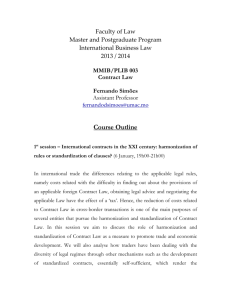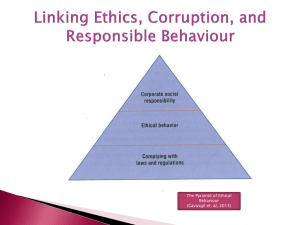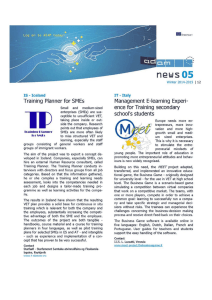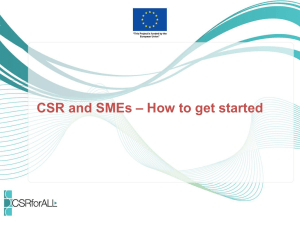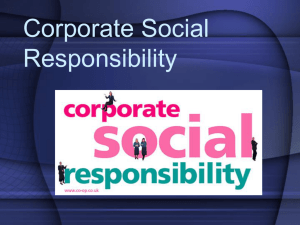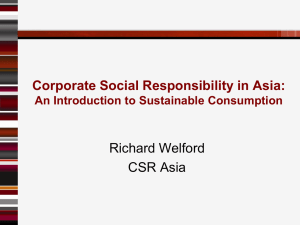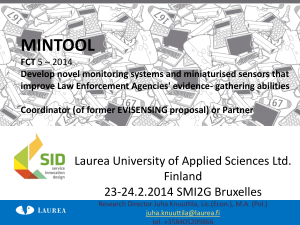Be ethical - Network for Business Sustainability
advertisement
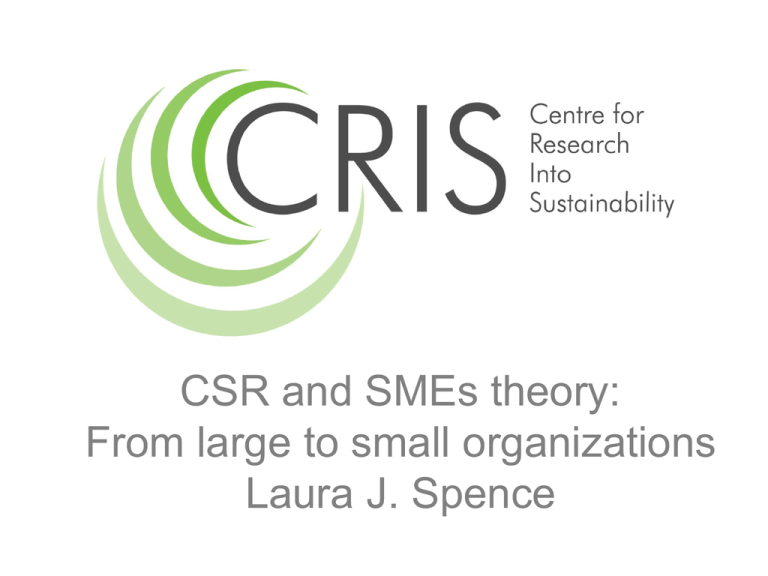
CSR and SMEs theory: From large to small organizations Laura J. Spence Thomas Holloway • Classic MNC • Classic Small Business • (C)SR in SMEs? Ownership and control Shareholder principal CEO agent Owner-manager as principal and agent Personal and family influence Discretionary SR implicit. Responsibility to family and self Governance and reporting Formalized and codified. Professionali zation of mgt Informal and personal No language or codification for SR Transactions (internal and external) Contract based. Profit & shareholder value max. Relationship based in embedded community networks. Reputation, status and legacy Personal trust Integrity Honesty Power structures Hierarchical Role orientated Flat, flexible, multitasking. O-M responsibility for and reliance on employees CSR Theory 1: CSR Pyramid Philanthropic Ethical Legal Economic Be a good corporate citizen. Contribute resources to the community; improved quality of life Be ethical. Obligation to do what is right, just and fair. Avoid harm. Obey the law. Law is society’s codification of right and wrong. Play by the rules of the game. Be profitable. The foundation on which all others rest. Carroll’s (1991) Pyramid of Corporate Social Responsibility Phil- Phil- anthropic anthropic Ethical Personal integrity Ethical Survival Survival Personal Integrity To selfand and family (1) To(a)self family Personal Four-part model of SME social responsibility integrity employees (2)(b) ToTo employees Philanthropic Survival Ethical Philanthropic Personal integrity Ethical (c) To the local community (3) To the local community Survival To business partners (4)(d)To business partners CSR Theory 2: Stakeholder theory Financiers Customers Employees Firm Communities Suppliers 7 Stakeholder Theory: Lge firm customer SMEs Employees Small local competitors X Ownermanager(s) Family Business Partners Supplier ‘The self’ Local community Explaining the SME Difference: An ethic of care People are relational and interdependent Valuing emotions Inclusion of the private sphere as territory for morality Accepts impartiality Source: Derived from Held (2006:10-13) Meeting the needs of others for whom we take responsibility Masculinist Interpretation of SHT Feminist Interpretation of SHT 1) Corporations as autonomous entities are bounded off from their external environment SMEs as webs of relations among stakeholders 2) Corporations control their external environment SMEs should thrive on chaos and embrace environmental change 3) The language of competition and conflict best describes the character of managing a firm Communication and collective action should describe the character of managing an SME 4) Objective thinking is needed to generate strategy Strategy as solidarity with decisions based on responsibilities and relationships 5) Corporations structure power and authority within strict hierarchies Structure power and authority through decentralization and empowerment. (Derived from Wicks, Gilbert and Freeman ,1994) Policy implications Cost rather than profit Personal rather than compliance-based responsibility Supply Chain Responsibility rather than customer pressure and codes Acknowledge care as part of business practice Importance of mentors, family, peers, networks and social capital Sector approaches Role for Regulation? Entreprenurs vs ownermanager Family firms Sectors Transition economies Ecopreneurs Franchises Virtual firms Informal economy Partnerships Social enterprises Venture capital owned Entrepreneurial type Sole traders/no employees Remember, SMEs are: • different in nature, not just size from large firms • often unfamiliar with corporate jargon • often led by people who do not want someone else telling them what to do • characterised by multi-tasking and fire-fighting • deserve our respect • should not be underestimated & can teach a lot to large firms 13 Professor Laura J. Spence Royal Holloway, University of London, UK Laura.Spence@rhul.ac.uk www.rhul.ac.uk/cris
